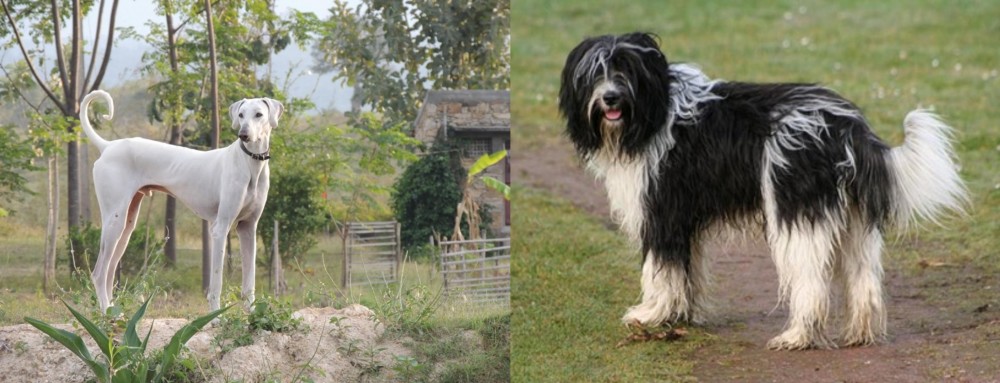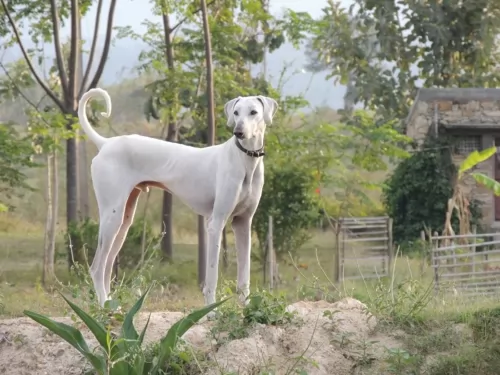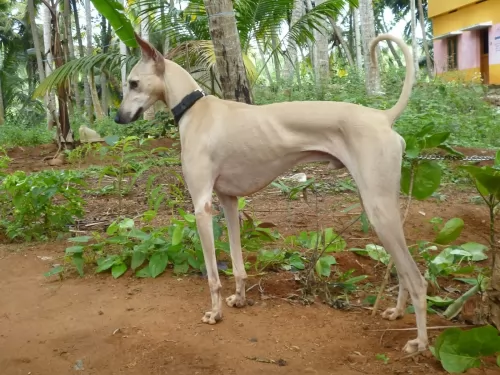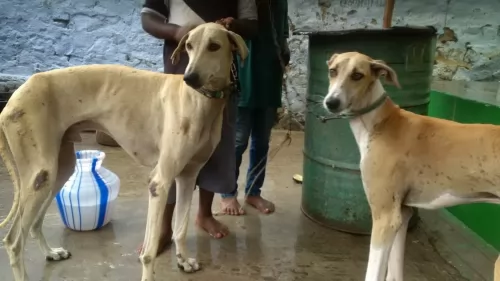 Petzlover
Petzlover Chippiparai is originated from India but Schapendoes is originated from Netherlands. Chippiparai may grow 13 cm / 6 inches higher than Schapendoes. Both Chippiparai and Schapendoes are having almost same weight. Both Chippiparai and Schapendoes has same life span. Both Chippiparai and Schapendoes has same litter size. Chippiparai requires Low Maintenance. But Schapendoes requires Moderate Maintenance
Chippiparai is originated from India but Schapendoes is originated from Netherlands. Chippiparai may grow 13 cm / 6 inches higher than Schapendoes. Both Chippiparai and Schapendoes are having almost same weight. Both Chippiparai and Schapendoes has same life span. Both Chippiparai and Schapendoes has same litter size. Chippiparai requires Low Maintenance. But Schapendoes requires Moderate Maintenance
 The Chippiparai is a working dog found in India and until recently there has been little interest in the purity of any breed, but rather only an emphasis on the abilities of the dog. They are only beginning to research the origin and history of their native dogs such as the Chippiparai. Not much is known about the origin of the breed except that it is found almost exclusively in Tamil Nadu and Keraia in the southern part of the subcontinent of India. Other than this there is much speculation about the breed’s origin but very little-known facts. It is indeed an ancient breed; however, its origin could be thousands of years ago or simply hundreds of years ago.
The Chippiparai is a working dog found in India and until recently there has been little interest in the purity of any breed, but rather only an emphasis on the abilities of the dog. They are only beginning to research the origin and history of their native dogs such as the Chippiparai. Not much is known about the origin of the breed except that it is found almost exclusively in Tamil Nadu and Keraia in the southern part of the subcontinent of India. Other than this there is much speculation about the breed’s origin but very little-known facts. It is indeed an ancient breed; however, its origin could be thousands of years ago or simply hundreds of years ago.
• Perhaps it is a descendant of the Saluki as it resembles this breed quite a bit. It has been believed for some time that the Saluki is the original sighthound and the source of all sighthound breeds. The Saluki was very popular in the Middle East, especially in Persia and Arabia from which it could easily have spread to India. It would then have been shared from Northern India to Southern India where the Chippiparai is found.
• Perhaps the Chippiparai is a descendent of sighthounds from Central Asia and Afghanistan – the Tazi, Taigan, Hortaya Borsaya or the Afghan Hound. This part of Central Asia had more trade, influence and contact with the Indian subcontinent early in their history than with any other region. The Chippiparai is considered by some to be more like these sighthounds than like the Saluki and the interaction between these regions has a much longer history than the Middle East and India.
• It is also speculated that the Chippiparai might have been developed completely and uniquely from the local street and working dogs. With the civilization of India being one of the oldest in the world, it is considered a possibility that the Chippiparai is the descendent of the Harappan hunting dogs that probably were developed by the Indus Valley or Harappa roiling class.
Wherever the Chippiparai came from, they were the exclusive property of the wealthy and ruling castes. These upper castes were the only ones that could legally hunt with dogs or afford to feed one. The royal classes of Tiruneivell, Thanjavur, and Madurai all fed the popularity of the breed among the upper castes. They were coursing dogs used to chase down the prey once it was sighted. The Chippiparai are incredibly fast runners and would catch almost any prey and either hold it or kill it for their hunter. The Chippiparai, when not hunting, had to be chained so they would not chase any small animal that they saw. This confinement also added to the purity of the breed as random breeding was prevented.
The southern part of the Indian subcontinent is extremely hot with routine temperatures over 100’. The Chippiparai was developed to withstand these extreme temperatures and is more heat tolerant than most any other breed. They also need very little food and are resistant to the many parasites and diseases found in southern India.
Harboring the belief that Indian dogs were not as good as European ones, the occupying countries of Portugal, France, and Britain, had no interest in the Chippiparai, again leaving the breed to develop naturally on their own with little or no interbreeding. They also received no formal recognition because Indian culture only valued the dog for its working abilities. There was no Indian Kennel Club until 1956.
The Chippiparai is now very rarely and only found in the area of its birth. Many believe the breed is in danger of becoming extinct and even though it is now registered with Indian Kennel Clubs it is not often shown in their dog shows. Lovers of the breed are now attempting to get Indians to recognize that the Chippiparai is a great companion animal and attempting to save the breed.
 Known also as the Dutch Sheepdog, the Schapendoes originates in the Netherlands.
Known also as the Dutch Sheepdog, the Schapendoes originates in the Netherlands.
It has always been known as a herding dog and farm dog. There were times during the 1940s when the dog’s numbers dropped considerably, but fortunately a breed club known as the Nederlandse Schapendoes was formed in 1947.
It wasn’t until 1971 that the dog earned recognition as a Dutch breed and the Federation Cynologique Internationale recognized this Dutch Sheepdog in 1989.
 The Chippiparai is a typical sighthound although their size and appearance will vary more than that of registered purebred sighthounds. Typically, they will have a long, domed head with small erect ears and dark eyes. Their muzzle will be as deep and wide as the skull but longer. Their legs are straight and long, their chest is roached back and deep, giving them, an appearance very similar to a greyhound or other sighthound.
The Chippiparai is a typical sighthound although their size and appearance will vary more than that of registered purebred sighthounds. Typically, they will have a long, domed head with small erect ears and dark eyes. Their muzzle will be as deep and wide as the skull but longer. Their legs are straight and long, their chest is roached back and deep, giving them, an appearance very similar to a greyhound or other sighthound.
They have a long curly tail, and their coat can vary greatly in color. They are medium sized, and their coat is short, shiny and close. He is very slender and sleek, which along with his long legs gives him that incredible speed. They are thin with visible ribs.
 The Schapendoes is a medium sized herding dog standing at between 40 and 50cm in height and weighing between 12 and 25kg.
The Schapendoes is a medium sized herding dog standing at between 40 and 50cm in height and weighing between 12 and 25kg.
When you look at him, you’re reminded of the Old English Sheepdog or the Bearded Collie. The thick, double coat of the dog can be a mix of colors and can be brown and white, black and white and gray and a mix of all these colors.
In spite of the thick coat, the dog sheds very little. He is an active dog and is known to be able to jump high. This makes him perfect for ball and frisbee games as he will leap into the air to try and catch the ball.
He has medium length floppy ears and the tail is long and feathered, carried high when busy, but when he is relaxed the tail hangs low.
Brave, cheerful,social and loyal, the Schapendoes is a shaggy Dutch dog who makes a splendid pet and companion for active people.
He is intelligent too, and in fact it is why he makes such a great farm dog too as he is able to work on his own and co-operates with his owner. He just loves being active, and will happily join you on all your hikes, runs on the beach, swimming, walks and other activities.
He thrives on being counted in as one of the active family members. This intelligence of his makes him easy to train and socialize, making him well mannered and obedient.
His amicable nature allows him to get on with all well disciplined children as well as with other pets in the home.
 The Chippiparai is a loving, gentle family dog if well socialized, well trained and well exercised. They are very intelligent and need human companionship. Once they are living with a human family, they are very protective of that family. They are for the most part peaceful and quiet dogs. They are loyal and loving but they are not overly affectionate. Cuddlers they are not, and they do not like to play rough with children.
The Chippiparai is a loving, gentle family dog if well socialized, well trained and well exercised. They are very intelligent and need human companionship. Once they are living with a human family, they are very protective of that family. They are for the most part peaceful and quiet dogs. They are loyal and loving but they are not overly affectionate. Cuddlers they are not, and they do not like to play rough with children.
Accepting and loving within the family, the Chippiparai are equally hesitant and shy around strangers. They can be suspicious, but they are not aggressive. They are just very aloof with strangers, yet they hardly ever bark.
 Because this dog has always been a working dog, he has learned to be independent.
Because this dog has always been a working dog, he has learned to be independent.
They’re eager to please their owners and easy to train too. They’re not aggressive and are friendly and affectionate and want to protect their owners.
They’re cheerful and playful and are tolerant of children and pets in the home. However, they don’t want little children being allowed to climb over them.
You can expect these big cuddly dogs to make loyal, devoted pets when treated with love, care, kindness and respect.
 There are no clinical studies regarding the health and health history of the Chippiparai, so little is known about their long-term health. However, most who know the breed, believe it is an incredibly healthy one. They seem to have a lot less genetically transmitted health issues than other purebreds. Because of their isolation for centuries in India, they have developed immunities and resistance to most parasites and diseases other dog suffer from.
There are no clinical studies regarding the health and health history of the Chippiparai, so little is known about their long-term health. However, most who know the breed, believe it is an incredibly healthy one. They seem to have a lot less genetically transmitted health issues than other purebreds. Because of their isolation for centuries in India, they have developed immunities and resistance to most parasites and diseases other dog suffer from.
Because of this you should look for the types of issues that occur in dogs of this size and build. Have them tested by the Canine Eye Registration Foundation and the Orthopedic Foundation for Animals.
 Your Schapendoes is a generally healthy breed and with good food, a good amount of exercise and plenty of love and care, he can reach the ripe age of 15 or so.
Your Schapendoes is a generally healthy breed and with good food, a good amount of exercise and plenty of love and care, he can reach the ripe age of 15 or so.
Every dog however, has the potential to get one of the many canine diseases there are. Some of these canine diseases to look out for include hip dysplasia, dental problems, eye diseases, bloat, cancer and others.
Some people think that problems with teeth are mild – nothing to worry about and yet bad teeth can affect the quality of life for your pet.
Problems with the pet’s teeth usually start with a build- up of plaque that leads to tartar. This can lead to gingivitis and then periodontal disease can develop. Dogs can have bad teeth and this can affect organs in the body.
Problems with the teeth can be serious and your veterinarian will need to do an oral checkup and dental cleaning. If your dog has oral problems, you may notice bad breath, loose teeth, dribbling, tartar on the teeth and pawing at the mouth.
 Do not overfeed your Chippiparai. Feed twice a day and no more than a total of 2.5 cups of high quality dry food.
Do not overfeed your Chippiparai. Feed twice a day and no more than a total of 2.5 cups of high quality dry food.
As mentioned previously the Chippiparai seems to have no genetic diseases or issues and very few acquired ones. However, he is sensitive to anesthesia and some foods. He is intolerant to cold weather and has a hard time with his pads on hard surfaces. Some Chippiparai might experience some of the ailments other breeds like them experience.
Both Elbow and hip are possible. This can cause arthritis and lameness. This occurs when the bone does not fit well into the joint.
This can cause lameness as well. The kneecaps slide over the knee instead of staying in place.
This is a hunting dog and he will want to hunt. They are incredibly fast and need the opportunity to run. Brisk walks will not be enough for this dog. He is very energetic. They will chase any small animals. It is not recommended that you have small pets even small dogs or cats with a Chippiparai. Having been bred for centuries to hunt, they are not likely to respond to any commands if they are off lease and chasing prey. Do not allow them to be off leash unless in a fenced area, and that fence needs to be 8 feet tall as they can easily jump a seven-foot fence. Try they at coursing, agility, fly ball and frisbee competitions.
 The Schapendoes has a dense double coat which can become quite long in places. The hair is slightly waved and there is quite a lot of hair around the face which includes a mustache and beard.
The Schapendoes has a dense double coat which can become quite long in places. The hair is slightly waved and there is quite a lot of hair around the face which includes a mustache and beard.
He will need to have his hair brushed twice a week, and some people choose to have him professionally clipped.
Trim his nails, check inside the ears for ear infection, check that the eyes are nice and clear without discharge, check inside the mouth for rotten teeth and check him over for any unusual lumps.
Your Schapendoes is an active dog and you want to ensure that the food you buy him keeps him active and healthy.
It is important to choose the best dog food if you buy commercially manufactured dog food. Then you can be sure it will have the right formulation of vitamins and minerals.
Home-made food is also an excellent choice for your pet. Boiled chicken, brown rice or pasta and spinach, sweet potatoes and carrots can be very healthy and tasty. Keep it simple like this. Chop it all up and add it into the dry kibble a couple of times a week to give him a nutritious treat.
Some raw meat added in occasionally will do him the world of good and keep the skin and coat healthy. Never leave your pet without a constant source of fresh, cool water.